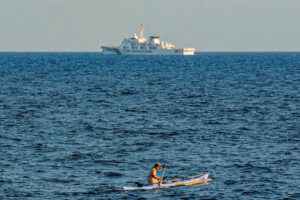
US condemns China’s ‘dangerous and escalatory actions’ in ramming event
THE US State Department on Sunday condemned what it called “dangerous and escalatory actions” by the Chinese Coast Guard after its vessel collided with a Philippine Coast Guard vessel three times near Sabina Shoal on Saturday.
“The People’s Republic of China’s (PRC) unlawful claims of “territorial sovereignty” over ocean areas where no land territory exists, and its increasingly aggressive actions to enforce them, threaten the freedoms of navigation and overflight of all nations,” spokesman Matthew Miller said in a statement on Sunday.
“The United States reiterates its call for the PRC to comport its claims and actions with international law and to desist from dangerous and destabilizing conduct,” it added.
The Chinese Embassy in Manila did not immediately reply to a Viber message seeking comment.
The US said the incident, which was the second confrontation between the Philippines and China at the shoal in days, damaged Manila’s vessel and jeopardized the safety of Filipinos aboard the ship.
Washington also reaffirmed its Mutual Defense Treaty with the Manila, which requires it to defend the Philippines in case of an armed attack on its forces, public vessels or aircraft in the South China Sea.
The Australian Embassy in Manila said Canberra shares Philippine concerns about China’s “destabilizing behavior at Sabina Shoal in the South China Sea.” “Repeatedly ramming vessels is unacceptable and dangerous. All countries must comply with international law. The 2016 arbitral award is binding on its parties,” it said in an X post.
The New Zealand Embassy in a statement said China’s “ramming” act was “profoundly troubling and fits a recent pattern of dangerous and destabilizing actions in the region.”
In a statement at the weekend, Chinese Coast Guard spokesperson Liu Dejun said China was exercising “indisputable sovereignty” at the shoal, adding Manila had acted in an “unprofessional and dangerous” manner.
Philippine Coast Guard spokesman Jay Tristan Tarriela on Saturday said Beijing’s vessel “directly and intentionally” rammed the BRP Teresa Magbanua. The Chinese vessel hit its port bow, starboard quarter and port beam.
The Philippine ship’s bridge wing and freeboard were also damaged, he said in an X post.
Speaker Ferdinand Martin G. Romualdez said it is high time for the Philippines to “consider stronger measures.” “We should enhance our presence in the West Philippine Sea, reinforce our alliances and ensure that our capabilities are sufficient to protect our sovereign rights,” he said in a statement, referring to parts of the South China Sea within the Philippines’ exclusive economic zone.
In a separate statement, Senator Jose “Jinggoy” P. Estrada, Jr. urged the government to raise these incidents to international courts and hold China accountable for its aggression.
“Our government has sufficient basis to take immediate and decisive legal action to hold China accountable for its increasingly aggressive actions,” he said.
“They have repeatedly endangered the lives of our brave men and women Coast Guard personnel and violated international maritime laws and sovereign rights,” he added.
Meanwhile, the National Maritime Council (NMC) on Saturday evening vowed to deter any aggressive acts at sea while using diplomatic channels.
“As directed by the President, the Philippines will fully utilize and continue to pursue diplomatic channels and mechanisms under the rules-based international order and pursue the peaceful resolution of disputes,” it said in a statement.
UNCALLED FOR
The agency said the Philippines would “not succumb to acts of harassment and aggressive behavior.”
The Philippine ship has near Sabina Shoal since mid-April, amid China’s alleged dumping of dead corals at the atoll to alter its elevation.
Sabina, which is 140 kilometers off the Philippine island of Palawan, has been a staging ground for resupply missions for Filipino troops at Second Thomas Shoal.
“China’s latest actions are uncalled for as the Philippine vessel was engaged in a peaceful and lawful patrol within its own maritime jurisdiction,” the Philippine maritime council said.
Samuel Paparo, commander of the United States Indo-Pacific Command, told a forum last week it was an “entirely reasonable option” for United States vessels to accompany Philippine resupply missions, though that would require consultation between the treaty allies.
Senate President Francis “Chiz” G. Escudero earlier said an escort arrangement would likely deter Chinese aggression.
Last week, Manila’s South China Sea task force accused Chinese vessels near Sabina Shoal of ramming and using water cannons against a Philippine fishery vessel transporting food, fuel and medicine for Filipino fishermen.
Beijing has pressed its claim to the disputed conduit for more than $3 trillion of annual ship-borne commerce, while Manila has kept up supply missions, particularly those to a beached naval ship at the hotly contested Second Thomas Shoal.
In 2016, an international arbitration court ruled that China’s claim was illegal, in a landmark victory for the Philippines, which filed the lawsuit, Beijing has rejected the decision.
Last month, the Philippines and China agreed on a “provisional arrangement” for resupply missions to Filipino troops at Second Thomas Shoal, after trading blame on raising tensions in the waterway.
Both countries also agreed to set up new lines of communication to improve their handling of sea disputes after resuming talks on easing growing tensions, the Department of Foreign Affairs said last month. — J.V.D. Ordoñez and K.A.T. Atienza



